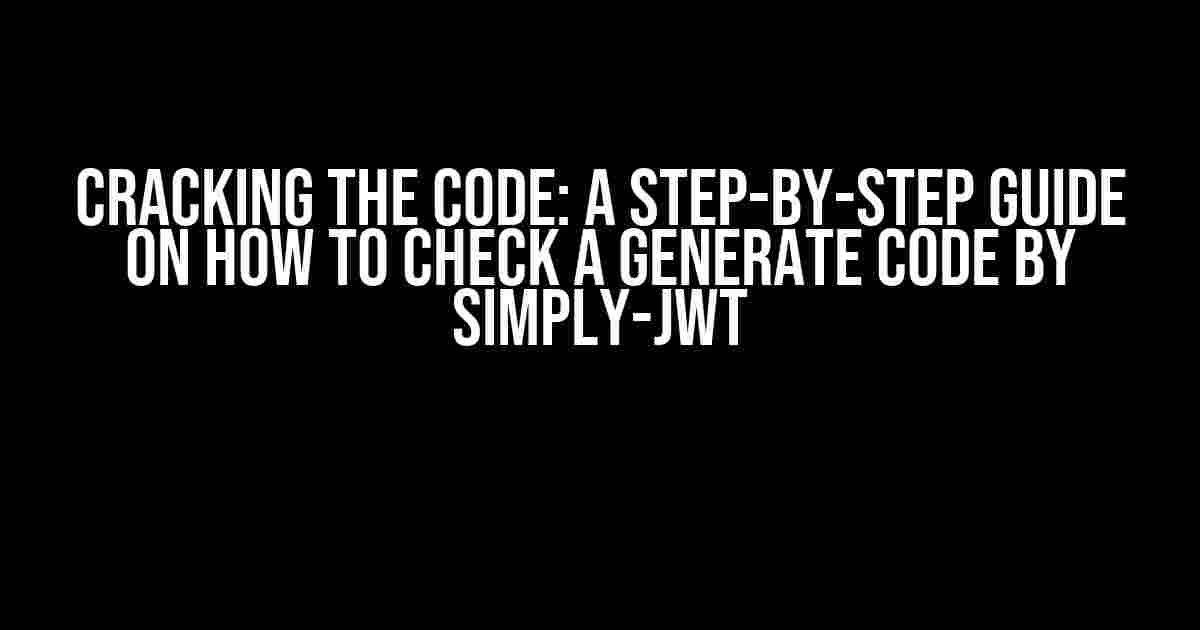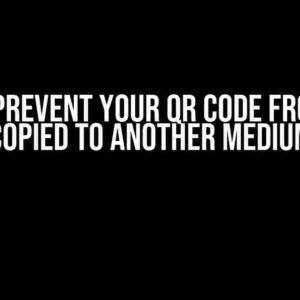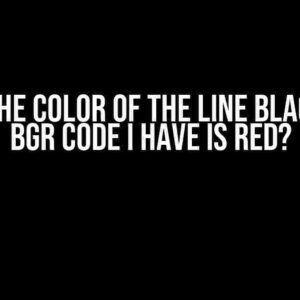Are you tired of scratching your head, trying to figure out how to validate a JSON Web Token (JWT) generated by Simply-JWT? Look no further! In this comprehensive guide, we’ll walk you through the process of checking a generated code by Simply-JWT, ensuring you’re well-equipped to tackle even the most complex JWT-related tasks.
What is Simply-JWT?
Before we dive into the nitty-gritty, let’s quickly cover what Simply-JWT is. Simply-JWT is a popular JavaScript library used to generate, verify, and decode JSON Web Tokens. It’s a lightweight, easy-to-use solution for implementing authentication and authorization in web applications.
Why Check a Generated Code?
Verifying a generated code is crucial in ensuring the integrity of your application’s authentication and authorization mechanisms. Here are a few reasons why:
- Security**: A tampered or invalid token can compromise your application’s security, allowing unauthorized access to sensitive data.
- Authentication**: Verifying the generated code ensures that the token is genuine and belongs to the intended user.
- Performance**: Validating the token helps prevent unnecessary requests to your server, reducing the load and improving overall performance.
Step 1: Install Simply-JWT
Before you can start checking generated codes, you need to install Simply-JWT. You can do this using npm or yarn:
npm install simply-jwt
// or
yarn add simply-jwtStep 2: Generate a JWT Token
Next, generate a JWT token using Simply-JWT. This token will contain the user’s data, such as their ID, email, and any other relevant information:
const simplyjwt = require('simply-jwt');
const payload = {
id: 1,
email: '[email protected]'
};
const secretKey = 'your_secret_key_here';
const token = simplyjwt.generate(payload, secretKey);
console.log(token); // Output: eyJhbGciOiJIUzI1NiIsInR5cCI6IkpXVCJ9.eyJpZGVudGl0eSI6MSwiZW1haWwiOiJqb2huLmRvZUBleGFtcGxlLmNvbSIsImlhdCI6MTU5NjM4ODMwfQ.SflKxwRJSMeKKF2QT4fwpMeJf36POk6yJV_adQssw5cStep 3: Verify the Generated Code
Now that you have the generated token, it’s time to verify it. You can use Simply-JWT’s built-in `verify` method to validate the token:
const verifiedToken = simplyjwt.verify(token, secretKey);
if (verifiedToken) {
console.log('Token is valid!');
} else {
console.log('Token is invalid or tampered with!');
}Understanding Verification Errors
In the event of a verification error, Simply-JWT will throw an error object containing information about the issue. You can catch and handle these errors to provide a better user experience:
try {
simplyjwt.verify(token, secretKey);
} catch (error) {
if (error.name === 'JsonWebTokenError') {
console.log('Token is invalid or tampered with!');
} else if (error.name === 'TokenExpiredError') {
console.log('Token has expired!');
} else {
console.log('An unexpected error occurred:', error);
}
}Decoding the Token
After verifying the token, you can decode it to access the original payload:
const decodedToken = simplyjwt.decode(token);
console.log(decodedToken); // Output: { id: 1, email: '[email protected]', iat: 15963883 }Common Scenarios and Solutions
In this section, we’ll cover some common scenarios you might encounter when working with Simply-JWT and generated codes:
| Scenario | Solution |
|---|---|
| Token is invalid or tampered with | Check the secret key, ensure it matches the one used during token generation. Verify the token’s payload and headers. |
| Token has expired | Implement token refreshing or renewal mechanisms. Consider using a shorter token lifetime. |
| Token is not recognized | Verify the token’s format and structure. Check the `typ` header and ensure it matches the expected type (e.g., JWT). |
Best Practices for Working with Simply-JWT
To get the most out of Simply-JWT and generated codes, follow these best practices:
- Use a secure secret key**: Ensure your secret key is unique, unpredictable, and kept confidential.
- Validate user input**: Verify user-provided data to prevent token tampering or manipulation.
- Implement token blacklisting**: Maintain a list of revoked or expired tokens to prevent their reuse.
- Use HTTPS**: Always use HTTPS to encrypt token transmission and prevent eavesdropping.
- Keep your library up-to-date**: Regularly update Simply-JWT to ensure you have the latest security patches and features.
Conclusion
In this comprehensive guide, we’ve covered the process of checking a generated code by Simply-JWT. By following the steps outlined above, you’ll be well-equipped to validate and verify JWT tokens, ensuring the security and integrity of your web application. Remember to stay vigilant, follow best practices, and keep your Simply-JWT library up-to-date to stay ahead of potential security threats.
Further Reading
If you’re interested in learning more about JWT, authentication, and authorization, check out these resources:
By mastering the art of checking generated codes by Simply-JWT, you’ll be able to build more secure, reliable, and scalable web applications. Happy coding!
Here are 5 Questions and Answers about “How to check a generated code by simply-jwt” in HTML format with a creative voice and tone:
Frequently Asked Question
Got questions about verifying those neat little codes generated by simply-jwt? We’ve got the answers!
Q1: What is the simplest way to check a generated code by simply-jwt?
Easy peasy! Just use the built-in verify() function provided by simply-jwt. Pass the token and your secret key as arguments, and it’ll return a JSON object with the decoded payload if the token is valid.
Q2: What if I want to check the token’s expiration time?
No worries! When you call the verify() function, it returns an object with an ‘exp’ (expiration time) property. You can then compare it to the current time to see if the token has expired.
Q3: How do I handle errors when checking the code?
Good question! The verify() function will throw a JsonWebTokenError if the token is invalid or expired. You can catch this error and handle it accordingly, such as by returning an error message to the user.
Q4: Can I check the audience or issuer of the token?
Absolutely! The verify() function also checks the ‘aud’ (audience) and ‘iss’ (issuer) claims in the token. You can pass options to the function to specify the expected values for these claims.
Q5: Are there any security considerations when checking generated codes?
Yes, always keep in mind that simply-jwt is just a tool, and you should follow security best practices when generating and verifying tokens. For example, keep your secret key secure, and use HTTPS to protect the tokens in transit.






